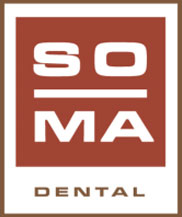Foods to Eat and Avoid During TMJ Treatment in San Francisco

If you're struggling with jaw pain, clicking sounds, or limited movement while chewing, you may be dealing with Temporomandibular Joint Disorder (TMJ). Fortunately, treatment options are available, and surprisingly, your diet can play a key role in your recovery. Choosing the right foods reduces strain on your jaw and supports healing. Whether you're already undergoing TMJ treatment or exploring your options, adjusting your meals is a simple yet powerful step.
In our previous blog, we addressed five key symptoms that indicate you may need professional TMJ care. In this blog, we will break down the best and worst foods to eat during your TMJ journey.
4 Foods to Avoid During TMJ Treatment
Avoiding jaw-intensive foods is essential to minimize irritation and avoid setbacks in your treatment. Despite their apparent innocuousness, these objects can aggravate inflammation and jaw discomfort.
1. Chewy Foods
Chewy foods such as bagels, steak, or licorice demand repetitive jaw motion and excessive force. This can easily exhaust the jaw muscles, increase inflammation, and worsen TMJ symptoms. Even chewing gum can be problematic during flare-ups.
2. Crunchy Snacks
Crunchy items like tortilla chips, raw carrots, popcorn, or nuts can aggravate the joint due to the sharp and jarring pressure needed to break it down. Crunching also causes microtrauma to an already sensitive TMJ, which may delay healing.
3. Sticky Foods
Foods like caramel, toffee, and even thick peanut butter tend to cling to your teeth and palate. This forces your jaw to work harder to maneuver and clean them from the mouth, increasing strain on the joint and surrounding muscles.
4. Hard Fruits and Vegetables
While fruits like apples and vegetables like celery are healthy, their firm textures require heavy biting and chewing. Eating these raw can overextend the jaw. It’s best to steam, bake, or blend them to make them easier on the joints.
4 Foods to Eat During TMJ Treatment
While avoiding harmful foods is important, choosing the right nourishing options makes a big difference too. These soft, anti-inflammatory, and healing foods can ease symptoms and support recovery, especially when guided by a trusted dentist near you in San Francisco who understands TMJ-specific dietary needs.
1. Cooked Vegetables
Steamed, roasted, or sautéed vegetables like squash, zucchini, carrots, and sweet potatoes are not only easy to chew but also packed with vitamins like C and A. These nutrients reduce inflammation and support tissue repair around the joint.
2. Soft Proteins
Protein is essential for muscle and joint repair. Instead of tough cuts of meat, opt for eggs, soft-cooked fish (like salmon or tilapia), tofu, or shredded chicken. These foods provide high protein content while being gentle on the jaw.
3. Smoothies and Soups
Blended smoothies with bananas, berries, spinach, and protein powders offer a nutrient-rich, chew-free meal or snack. Warm soups like butternut squash, tomato, or bone broth-based options can soothe discomfort while delivering hydration and healing minerals.
4. Whole Grains
Grains like oatmeal, quinoa, couscous, and soft brown rice are gentle on your jaw when cooked thoroughly. They’re also rich in fiber, which supports gut health and energy levels during your recovery.
Why Diet Matters During TMJ Recovery
The foods you consume can either aggravate or alleviate your TMJ symptoms. A soft, nutrient-dense diet reduces strain on the joint and allows it to heal without unnecessary pressure or movement. Dental professionals at a reputable dental clinic in San Francisco often include dietary recommendations in their treatment plans for this very reason. Eating the right foods also helps you avoid secondary issues like headaches, facial tension, and jaw locking, which are commonly triggered by poor dietary choices.
Conclusion:
TMJ disorder can be painful and disruptive, but the right food choices can make a significant difference in your treatment outcome. Avoiding chewy, crunchy, and sticky foods while incorporating soft, healing alternatives can ease your symptoms and speed up recovery.
The first step in finding a reliable source of TMJ treatment in San Francisco is scheduling a consultation to go over your symptoms and receive a customized care plan. And next time you're searching for a dentist, remember that nutrition is just as important as any other part of your dental health journey. Call now at (415) 558-9800!





